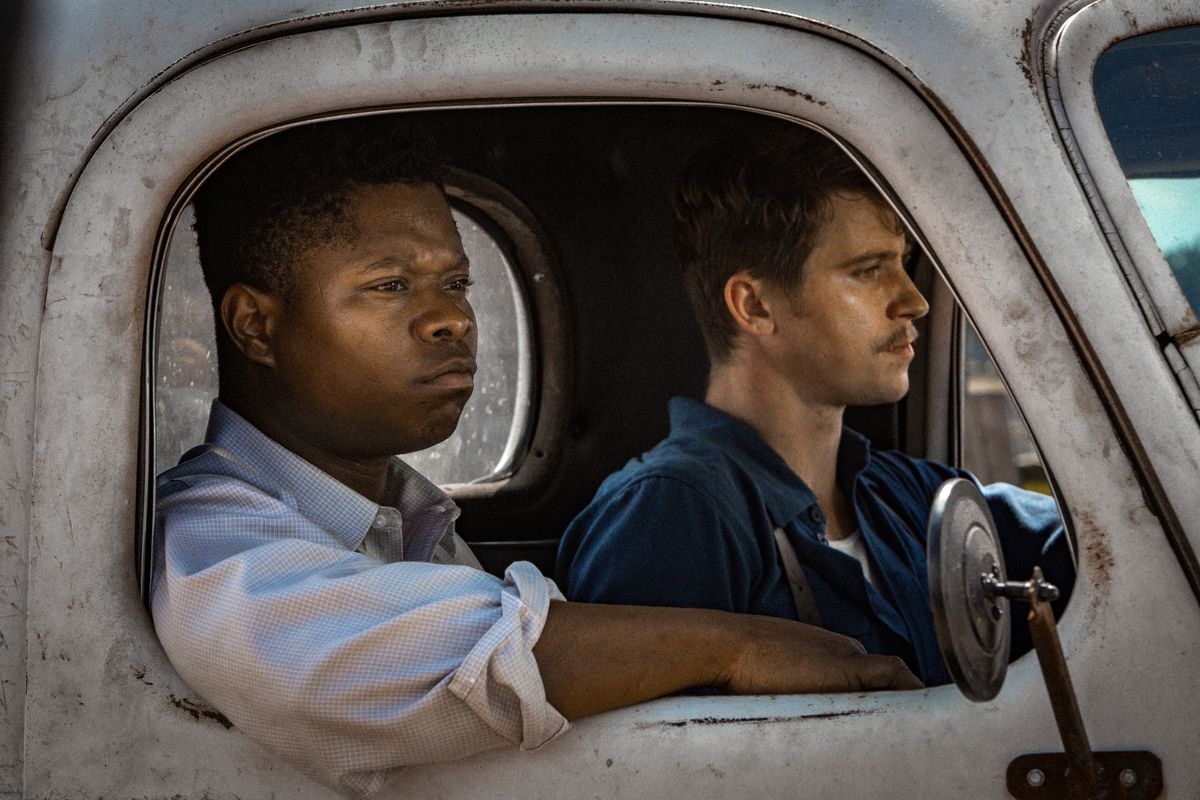
MPAA Rating: R | Rating: ★★★★
Release year: 2017
Genre: Drama Director: Dee Rees
Mudbound powerfully proves cinema as both a textual and visual medium, the word and image combined as one. It wears its literary strengths on its sleeve through poetic narration and an emphasis on dialogue. Yet its cinematography and color palette are equally striking; the greens, golds and browns of the WWII-era Mississippi farmland glow with vibrancy. Both of these elements–the literary and the visual–are in a unique harmony here, working together to bring this dramatic, affecting story to life.
From the opening scene, we know this story is about familial history and racial tensions as the McAllan brothers, Henry (Jason Clarke) and Jamie (Garret Hedlund), dig a grave to bury their father (Jonathan Banks). They discover the site they’ve chosen is the grave of a former slave, evidenced by the chains entwined with the skeletal remains unearthed by their shovels. One brother questions burying their father atop the grave of a black person, while the other brother keeps digging. Filmmaker Dee Rees (Pariah, Bessie) shows us everything we need to know in these opening moments–this will be a tale of the land, its harsh history, and its connection to human mortality. In this, Mudbound is an exposition on Genesis 3:19:
“By the sweat of your brow
you will eat your food
until you return to the ground,
since from it you were taken;
for dust you are
and to dust you will return.”
Based on the novel by Hillary Jordan, Mudbound is a familial drama and a period piece centered on two families, the McAllens and the Jacksons, working alongside one another on a remote Mississippi farm. Their lives parallel and intersect as we await the inevitable clash and conflict which may come. The McAllens are the new white landowners, while the Jacksons are black sharecroppers. Each sends a family member to fight in WWII, Jamie from the McAllens as a bomber pilot, and Ronsel (Jason Mitchell) as a tank driver. The soldiers fight to survive as the experience of war leaves them both traumatized and enlightened. Those left behind fight their own battles with the natural elements as they work the land, as well as misfortune. The Jacksons’ lose a mule to disease, and the patriarch Hap (Rob Morgan) suffers a broken leg from a fall. Florence Jackson (Mary J. Blige) helps support Laura McAllen (Carey Mulligan) as a sort of nanny, even as she has her own family to raise and nurture.
Mudbound has many characters, each with their own relational dynamics interacting with the others. Entire films could be made about any one of these intersections–Jamie and Henry’s sibling rivalry, Henry and Laura’s loveless marriage, Hap and Florence’s marriage, Hap and Henry’s conflicts, etc. The film loosely ties these all together through the relationship between Ronsel and Jamie, who develop a taboo friendship based on their shared trauma from the war. Mitchell and Hedlund give exceptional, authentic performances in their respective roles, though one could celebrate any of the actors here–every portrayal is rich and complex, the line readings and narration given with enough literary flair to feel the novel source material, while nonetheless remaining cinematic.
Mudbound is a richly Christian film, in the best sense of this descriptor. It’s not a “faith-based film” nor evangelistic; it simply depicts characters of a Christian faith with authenticity and grace. That faith and spirituality play key roles in characters’ lives–particularly within Hap as the pastoral leader of a local black congregation–never feels out of place, nor disparaging of religion. The events of the film even feel biblical, the conflicts and violence infused with spiritual fervor, the ethical questions and moral decisions ripe for spiritual contemplation from the audience. Christianity has been both a source of hope in the midst of systemic injustice, as well as the religious crutch for perpetrating that very injustice. The KKK shows up in the film, and it’s both ugly and infuriating. Mudbound elicits the same cry the Lord made to Cain after he murdered his brother Abel: “What have you done? Listen! Your brother’s blood cries out to me from the ground.” The blood of slaves and sharecroppers cries out from American soil, calling for justice and remembering the violent and unjust history of the nation. Mudbound dares to dig up this blood-soaked earth and artfully ask us to consider our heritage.
IMDB Listing: http://www.imdb.com/title/tt2396589/
Leave a Reply